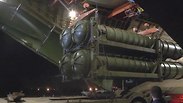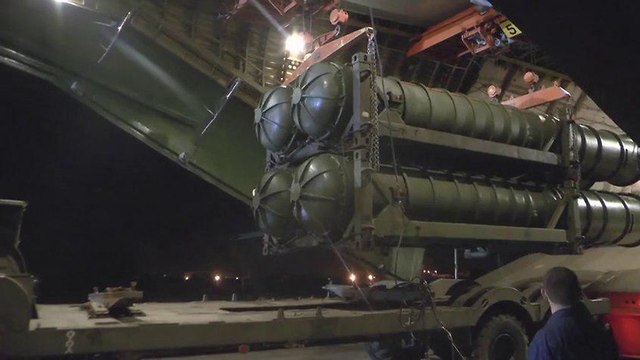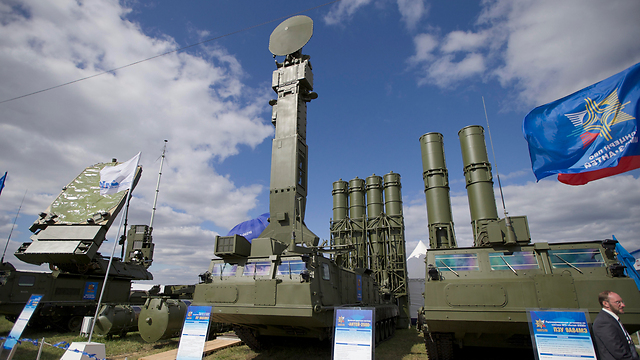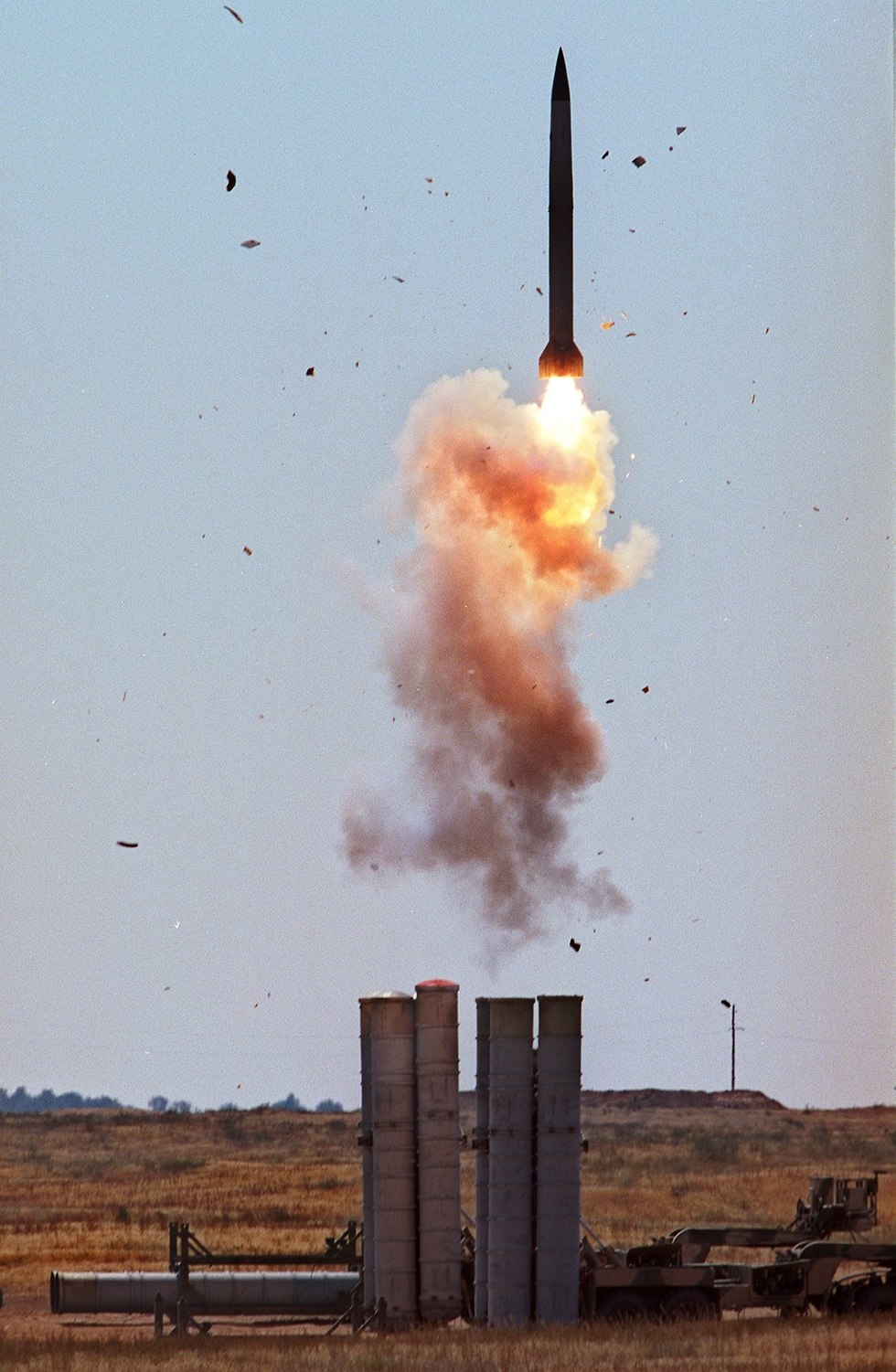
Israel can overcome the S-300, but must resolve crisis with Russia
Analysis: In the wake of the shooting down of the Russian intelligence plane, the Kremlin delivered S-300 anti-aircraft batteries to Syria, making IDF operations difficult, but not impossible. At the same time, a diplomatic confrontation with a world superpower is ill-advised, to put it lightly, and so Netanyahu must make some diplomatic moves. And perhaps Trump will finally wake up and intervene.
Vladimir Putin said on the eve of Yom Kippur that Russia will take "steps that everyone will notice" in response to the Russian intelligence plane that was shot down in Syria. Last week, his defense minister Sergey Shoygu made good on that threat when he announced three steps to bolster the Syrian army's defenses and limit Israel's aerial freedom of operations in Syria and likely in Lebanon as well.
These are the three steps, arranged according to the level of severity.
1. Provide the Syrian aerial defense apparatus with Russian-made anti-aircraft S-300 missile batteries.
2. Provide the Syrian aerial defense apparatus with modern electronic control and monitoring systems. This will allow the Syrians to better differentiate between enemy and friendly planes and automatically "lock" onto hostile targets without requiring a decision from the battery commander, which could lead to mistakes. This system will also apparently allow the Russian aerial defense commanders in Syria to control both the S-300 and the Syrian army's other missile systems.
3. Use electronic and cyber warfare to disrupt GPS navigating systems and radars installed on fighter jets that Russia wants to prevent from nearing Syrian or Lebanese airspace or from attacking targets in Syria. Russian Defense Minister Shoygu may not have said this measure was meant to prevent Israeli jets from reaching areas from which they could fire into Syria or to disrupt missiles or bombs the IAF launches, but it's clear the Israeli Air Force's fighter jets and precision-guided arms were what the Russians had in mind.

In any case, even if the Russians' goal was to prevent and disrupt the operations of Israel's fighter jets and missiles in Syrian and Mediterranean airspace, it's clear these measures could also disrupt the operations of American, French and British fighter jets that are combating ISIS forces in this area. In addition—and this is truly dangerous—these measures would disrupt commercial planes flying routes between Cyprus and the shores of Syria and Lebanon. Commercial flights to and from Israel—mostly to Europe and Turkey—might also be affected by these measures.
Taking advantage of others' troubles
On the surface, it appears these are the most severe steps Russia has taken against Israel since the 1973 Yom Kippur War.
It is safe to assume the severity of these measures is due to the outrage of the commanders of Russian air and aerial defense forces stationed in Syria. The Israeli Air Force attack in Latakia and the shooting down of a Russian intelligence plane with a Russian missile by the Syrian air defense forces—who are trained and supervised by Russian forces—presents these commanders to the Russian public and the Kremlin as completely inept and as those who don't understand what's going on around them. This is what led to the unrestrained lashing from the Russian Defense Ministry spokesman and the fabricated story about the Israeli jets using the Russian plane as bait, leading to it being shot down.
Another reason for the severe steps taken by the Russians is the desire to stop IAF strikes in Syria, or at the very least considerably reduce the number of attacks—over 200 of which were carried out over the past year, according to the IDF. This number led both Syrian President Assad and the Iranians to complain that the Russians are not providing them with sufficient defense. The Russians, in turn, are worried these complaints would lead Assad—under Iranian influence—to thank Moscow for its help and politely ask the Russians to leave Syria, which would undermine Putin's economic and geo-political interests.
Providing the Syrians with S-300 batteries and other aerial defense measures allows the Russians to show Assad that he can't survive without their help, as well as that they're committed to him (and not just Assad: the Iranians are also in the debt of the Russians, who back them not just in words but now in actions as well).
The second reason is diplomatic: the Russians want Assad to be entirely dependent on them, and the shooting down of the Russian plane gives them a diplomatic achievement, which turns the Syrian president—and to a certain extent the Iranians—into their "vassals."
Another reason for the series of unusual measures is that the Russians are also hoping for financial gain. They are not giving the Syrians the S-300 system for free. This is an expensive system, and it is likely the Iranians are the ones who would have to foot the hundreds of millions of dollars bill.
As usual, the Russians know how to gain from any trouble around them. What's concerning is that the Americans have not really interfered so far. Trump's National Security Advisor John Bolton and Secretary of State Mike Pompeo may have dubbed this as a "significant escalation" and expressed hope Russia would reconsider the move, but so far Washington has left Jerusalem to deal with the shooting down of the plane on its own. President Trump might intervene and help ease the burden, but meanwhile it's Prime Minister Benjamin Netanyahu and Defense Minister Avigdor Lieberman who are facing Putin, the Russian Defense Ministry and the Russian military, who really dislike us these days.
The IDF knows the S-300 well
Nevertheless, there is no reason for panic or over-pessimism. It's important to thoroughly examine the details in order to reach a sobered assessment of the real effect the Russian steps would have on the IDF's aerial freedom of operations and on Israel's ability to thwart Iran's military entrenchment in Syria.
The S-300 system is indeed more effective and advanced than any other interception system the Syrians had prior. It can intercept not only planes but also ballistic missiles at a range of up to 250 kilometers and at very high altitudes.
Syria sought to buy such a system from Russia back in 2009. The Iranians were willing to pay for it, but pressure on Putin from Netanyahu and former US President Barack Obama stopped the deal in 2013. Syrian aerial defense officers had already begun training with the S-300 in Russia, and Assad's army had already started receiving parts of the system—including vehicles to carry launchers, command and control trailers and other logistical vehicles—but until now Putin had avoided providing Assad with the full system.
In April, Putin resisted pressures from his generals, who wanted him to provide the system to Syria as a retaliatory move for the Israeli strike on Iranian weapons in the Syrian T4 air base, where Russian military personnel were stationed at the time. But now, it's harder to thwart the plans of the Russian generals and the Russian military industry to sell the S-300 to the Syrians.
It's important to note that the S-300 system has several models, and the older models have already been sold to over 20 countries, including Greece and Cyprus—which are friendly to Israel and have close military cooperation with it.
The S-300 system the Syrians asked for is called SA10 by NATO. It is a model both Greece and Cyprus already have, and so it is safe to assume Israel's Air Force and military industries have already gotten a chance to study it.
Iran, meanwhile, has a more advanced model of the S-300 system. Putin had initially heeded Israeli and American pressure not to sell the S-300 system to Tehran, with the understanding it would be used to defend Iran's nuclear weapons production and development sites if the West decides to take military action against the Islamic Republic.
But two years ago, following the agreement between Tehran and world powers to suspend its nuclear activity, Russia delivered the S-300 batteries to Iran. This, it's safe to say, led Israel—and mostly the IDF and Israeli defense industries—to accelerate the development of an answer in the form of methods and measures that would neutralize the threat of the S-300 system to Israeli and Western aerial freedom of operation.
By the way, the newest model of the S-300 (officially known as S-400)—which has not yet been delivered to other countries—is already in Syria and operated by a Russian force, defending the Khmeimim Air Base, 25 kilometers south of Latakia, where Russian troops are stationed. That battery was stationed there several years ago, after the Turkish air force shot down a Russian plane. The battery hasn't been used since, but it's possible that if another crisis develops in the future, the Russians might be tempted to try to use that advanced system against the Israel Air Force. This is not a threat that can be handled, but it needs to be taken into consideration.
The bottom line is this: Russia providing the S-300 system to Syria is indeed not good news for Israel, but it is not a threat that would prevent the IAF from carrying out the missions it was tasked with. It will only require more effort, more planning and more caution in the use of force in Syrian and Lebanese airspace.
But, as already noted, in addition to the delivery of the S-300 batteries, Russian Defense Minister Shoygu announced he was providing the Syrian aerial defense apparatus with electronic control and monitoring systems. This measure will improve the response speed of the Syrian missile batteries, but not considerably.
The importance of these systems is in changing the situation in which Syrian missile operators cannot tell the difference between Russian or Iranian planes and Israeli planes. This was one of the main issues that led to the shooting down of the Russian intelligence plane: the Syrians didn't have the identification friend or foe modes (IFF) of the Russian plane, and they shot it down without even trying to use other measures that would've allowed them to identify it as a friendly or civilian plane. The Russians didn't give the IFF to the Syrians and paid for it dearly, and this is one of the reasons they're taking out their anger on Israel.
The third step Moscow is taking should not be taken lightly: the use of electronic and cyber warfare to disrupt Israel's fighter jets, missiles, drones, rockets and other armaments could somewhat limit the freedom of operation of the IDF's aerial systems. But the high-tech and cyber capabilities of Israel and the IDF will likely manage to deal with this threat as well after not a long period of examination and adjustment.
And still, Russia is a world power and has kinetic military capabilities and cyber capabilities that Israel shouldn't and has no need to deal with. Israel needs to avoid becoming Russia's enemy as much as possible, and prevent a situation in which the anti-Israeli figures in the Russian security establishment might force Putin to have a direct and public confrontation with Israel in Syrian territory. Such a confrontation would not be good for Russia, but Israel would be the one suffering severe damages, while the Iranians, Hezbollah and the Syrian regime would be celebrating.
Therefore, in tandem with the efforts to deal with the new military situation in Syria, Israel must make diplomatic efforts to bring this crisis to an end and resume the coordination and cooperation with the Kremlin. The diplomatic effort must now be at the forefront, and with it Israel will perhaps be able to reduce the steps Russia is taking.
There are several necessary diplomatic moves to be made, including Prime Minister and Foreign Minister Netanyahu doing everything he can to recruit the help of President Trump and the Pentagon. The ongoing paralysis in the American administration vis-à-vis the situation in Syria is a leftover from the Obama administration, and it is harmful to Israel because it leaves us alone facing Iran (a regional superpower) and Russia (a world superpower). It's time for the US to get off the fence. It has enough military assets in Syria and the Mediterranean and enough leverage with which to pressure the Kremlin to rein in the Russian generals.





















